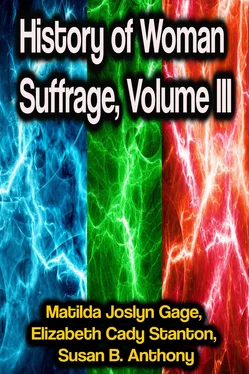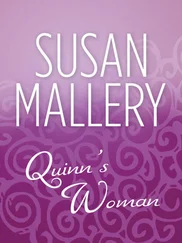Lewise Oliver.
Philadelphia , July 13, 1876.
The press of the country commented extensively upon the action of the women:
At noon to-day, in the First Unitarian church, corner Tenth and South, the National Woman Suffrage Association will present the Woman's Declaration of Rights. The association will hold a convention at the same time and place, at which Lucretia Mott is announced to preside, and several ladies to make speeches. Most of the ladies are known as women of ability and earnest apostles of the creed they have espoused for the political enfranchisement of women. Their declaration of rights, we do not doubt, will be strongly enforced. These ladies, or some of them, have been assigned places upon the platform at the grand celebration ceremonies to take place in Independence Square to-day; and they have requested leave to present their declaration of rights in form on that occasion. They do not ask to have it read, we believe, but simply that the statement of their case shall go on file with the general archives of the day, so that the women of 1976 may see that their predecessors of 1876 did not let the centennial year of independence pass without protest.—[Philadelphia Ledger , July 4.
There was yet another incident of the Fourth, in Independence Square. Immediately after the Declaration of Independence had been read by Richard Henry Lee, and while the strains of the "Greeting from Brazil" were rising upon the air, two ladies pushed their way vigorously through the crowd and appeared upon the speaker's platform. They were Susan B. Anthony and Matilda Joslyn Gage. Hustling generals aside, elbowing governors, and almost upsetting Dom Pedro in their charge, they reached Vice-President Ferry, and handed him a scroll about three feet long, tied with ribbons of various colors. He was seen to bow and look bewildered; but they had retreated in the same vigorous manner before the explanation was whispered about. It appears that they demanded a change of programme for the sake of reading their address; but if so, this was probably a mere form intended for future effect. More than six months ago some of the advocates of female suffrage began in this city their crusade against celebrating the centennial anniversary of a nation wherein women are not permitted to vote. The demand of Miss Anthony and Mrs. Gage to be allowed to take part in a commemoration which many of their associates discouraged and denounced, would have been a cool proceeding had it been made in advance. Made, as it was, through a very discourteous interruption, it pre-figures new forms of violence and disregard of order which may accompany the participation of women in active partisan politics.—[New York Tribune .
The letter of a correspondent, printed in another column, describing the presentation of a woman's bill of rights, in Independence Square on the Fourth of July, will interest all readers, whether or not they think with the correspondent, that this little affair was the most important of the day's proceedings. We have not a doubt that the persons who were concerned in the affair enjoyed it heartily. Those of them who made speeches naturally regarded their eloquence as a thing to stir the nation. All persons who make speeches do. The day was a warm one, and imagination, like the fire-cracker, was on fire. In the heat of the occasion, of course, the women who want to vote and who desire the protection of the writ of habeas corpus against the tyranny of actual or possible husbands, felt that they were making great folios of history; but the sagacity of the press agents and reporters was not at fault. The gatherers of news know very well what they are about; and when they decided to omit this part of the proceedings from their reports, they simply obeyed that instinct upon which their livelihood depends—the instinct, namely, to write only of matters in which the public is interested.
The good women who wrote and published this declaration, fancying that they were throwing a bombshell into the gathered crowds of American (male) citizens, are very much in earnest, doubtless, and are entitled—we have platform authority for saying it—to "respectful consideration"; but their movement scarcely rises, as yet at least, to the dignity of a great historical event. There is a prevailing indifference to their cause which is against it. The public is not aroused to a fever heat of indignation over the wrongs which women are everywhere suffering at the hands of the tyrants called husbands. The popular mind is not yet awake to the fact that men usually imprison their wives in back parlors and maltreat them shamefully. The witnesses, wives to wit, refuse to bear testimony to this effect, and the public placidly accepts appearance for reality and believes that the gentlewomen who ride about in their carriages or haunt the shops of our cities in gay apparel are reasonably well contented with their lot in life. In a word, it is not hostility so much as calm indifference with which the advocates of woman suffrage have to contend, and unluckily for them the indifference is very largely feminine.—[New York Evening Post .
There is something awful in the thought that should the woman suffragists be continually refused a voice in the affairs of the nation they might at last in a fit of desperation, do what our fathers did, and frame a declaration of independence, No, 2. Just think of an army of crinolines willing to take arms against the tyrant man, and sacrifice their lives, if need be, to carry out their principles! It is easier to ridicule the woman suffrage movement than to answer the arguments advanced by some of the leading advocates of that question. It is only the innate mildness of the position of women in general that has prevented a revolution on this same subject long ago. One hundred thousand such fire-eaters as Susan B. Anthony or Elizabeth Cady Stanton in the land, could raise a rumpus which would cause the late unpleasantness to pale into insignificance. Armed and equipped, what a sight would be presented by an army of strong-minded women! There would be no considering the question of whether the cavalry should ride side-saddle, or a la clothes-pin. Such detail would be of too small importance to receive the slightest attention; the more vital questions would be, "How can we slaughter the most men?" "How can we soonest convince the demons that we have rights which must be respected?" The fact is, that if these down-trodden women would take a firm stand in any thing like respectable numbers, and assert their claims to suffrage at the point of the bayonet, they would be allowed everything they asked for. There is not a man in the land who would dare to take up arms against a woman. Such a dernier resort on the part of the women would be truly laughable, but the matter would cease to be a joke, if General Susan B. Anthony, in command of a bloomer regiment, should march into the halls of congress, armed cap-a-pie , and demand the passage of a law in behalf of woman suffrage, or the alternative of the general cleaning out of the whole body. There is no immediate prospect of such an event, but "hell hath no furies like a woman scorned." Long and loud have been the appeals of the fair sex for recognition at the ballot-box. With that faithful zeal so truly characteristic of her sex, she has each time, for many years in the history of this country, presented herself before the curious gaze of our national conventions, asking, with no little stress of argument, for a woman's plank in the platforms. If she has been heard at all in the framed resolutions of the parties, the feeling prevailing in the conventions has been rather to pacify and put her off, than to grant her request through motives of political policy. If perseverance is to be awarded, the agitators of the woman question will yet carry off the prize they seek. Death alone can silence such women as Susan B. Anthony and Cady Stanton, and their teachings will live after them and unite others of their sex into strong bands of sisterhood in a common cause. It is safe to say, if events march on in the same direction they have since the calling of the first National Woman's Convention, another centennial will see woman in the halls of legislation throughout the land, and so far as we are concerned we have no objection, so long as she behaves herself.—[St. Louis Dispatch , July 13.
Читать дальше












